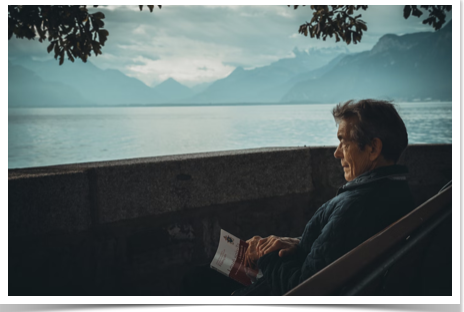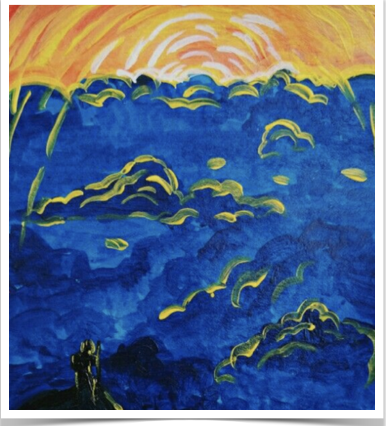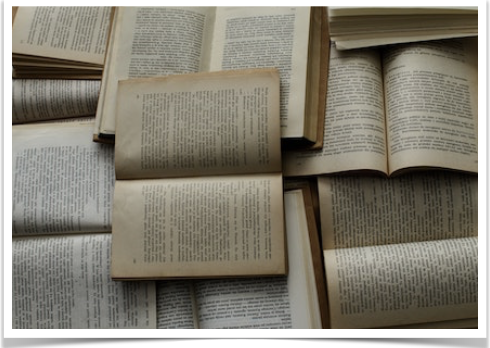Tropicana Orange and The Meaning of Life
Originally published on December 1st, 2024
“What’s your favorite color, and why?”
My first ever Toastmasters impromptu speech (two minutes, no prep) and this was my topic?! I thought for a moment. Precious seconds ticked by. Then it struck me:
“My favorite color is Tropicana Orange. As a kid, we drank orange juice. Every day, twice on Sundays. And in the top right corner of the juice carton, tucked against where the cardboard folds, there was an orange. An orange imbued with the deepest, most perfect orangey-red hue, bold yet beautiful, an incarnation of fiery understatement. And every morning at breakfast I would stare at the orange-red fruit, and I knew not why, but I loved it. It grabbed at my attention and never stopped. There was some mystery in that orange that I never fully unraveled, and never got over. I remember it clearly to this day. So that’s my favorite color: Tropicana orange.”
Scattered applause. I’d survived. Only later would I discover my answer touched life’s deepest meaning.
______
When I try to convey the radiance of Emerson, or Emily Dickson (or Rilke, or Pessoa), words fail. Images must take over.
Here’s the latest image I’ve invented: A sheet of paper lies flat on a table. You press your palm and five fingers against it, then swiftly pull all your fingers back. Crinkle crinkle. Two dimensions becomes three. Do this quickly several times and it’ll tear. You’ve formed a hole in the center in the page. Keep going and soon it’s wide enough to fit your whole hand.
I’ve come to realize that this is what The Greats did in their writing. Emerson and Dickinson (and Rilke and Pessoa) held out their open hand, pressed their palm against the flat fabric of reality. And in their genius wisdom, they swiftly pulled their fingers back. Over and over and over. Until, suddenly, they’d torn a hole into space and time itself. This visible, touchable reality, that which we’re wired to assume is most real — Emerson and Dickinson (and Rilke and Pessoa) ripped right through it. A fake! A facade! And on they tore, and deep into the heart of the invisible actually real they peered, and my God, behold what they found! The bubbling, broiling, Infinite Magma, the limitless source, the endless eternal self. And in their writing, these “boring” black-and-white figures yell at us, begging to the world, “Look, LOOK! Look what I’ve found! It’s glorious! And you have it too, inside yourself, this churning life force, dynamic and alive beneath your crusty Pangea plates, if you would please take a minute to look at your inner self!” And in my mind, this lava of life glows Tropicana Orange.
Have you seen it? What does it look like to you? And what are you doing about it?
I’ve seen it. This year. Call it a rediscovery. My first pass at life-stirring literature half a decade ago gave me a glimpse. And then as work took priority, head self eclipsed heart self, and my inner self receded. Upon arriving in Kunming, China in March, it roared back suddenly, with unexpected force. After four intense years of company building, I gave myself a year off to study Chinese full-time. And as I spoke Chinese for hours each day, and spent my time reading Emerson, and others, back my inner self came. I relearned the great Transcendentalist truth, that the inner self truly is primary, and that viewable, touchable reality is secondary. It’s a profound truth that must be felt to be believed.
But that’s why reading these Greats feels like the most real thing in life, to me. Time feels different. Their profound truth smacks me across the face again and again, the reality of their ideas pierce ever deeper, cracking open my own true self. And it’s not just theory. Once you see and feel your inner self, you can align your life to it. You develop an ever-stronger instinct for what actives make you feel Flow, Aliveness, Resonance, and Attunement. The difference is not linear. Things properly aligned with your inner self aren’t 2x better than the default option, but 100x or 1000x better. I know this firsthand. Hour upon hour of speaking Chinese unleashes a flood of good feeling that’s exceptionally difficult to describe, but it satisfies my soul, so I know it’s truth. It’s absolutely self-justifying, the peace that passes all understanding. You know because you know because you know. You know because you’ve tapped into the infinite inner source. Let there be no doubt, this is what you’re meant to do.
And it’s not just Chinese. For me it’s also reading the right books, having conversations with the right people, pondering the right awe-inspiring questions-that-can’t-be answered. That which lights an uncommon fire within, and endless fiery Tropicana Orange.
But don’t just take my word for it. Listen to The Greats who pierced reality long ago and showed me the way:
Ralph Waldo Emerson:
“The magnetism which all original action exerts is explained when we inquire the reason of self-trust. What is the nature and power of that science-baffling star which shoots a ray of beauty even into trivial or impure actions, if the least mark of independence appear? The inquiry leads us to that source, at once the essence of genius, of virtue, of life, which we call Spontaneity, or Instinct. We denote this primary wisdom as Intuition, whilst all later teachings are tuitions. In that deep force, the last fact behind which analysis cannot go, all things find their common origin.”
“We lie in the lap of immense intelligence, which makes us receivers of its truth and organs of its activity. When we discern justice, when we discern truth, we do nothing of ourselves, but allow a passage to its beams. If we ask whence this comes, if we seek to pry into the soul that causes, all philosophy is at fault. Its presence or its absence is all we can affirm. Every man discriminates between the voluntary acts of his mind and his involuntary perceptions, and knows that to his involuntary perceptions a perfect faith is due.”
“Perception is not whimsical, but fatal. If I see a trait, my children will see it after me, and in course of time all mankind — although it may chance that no one has seen it before me. For my perception of it is as much a fact as the Sun.”
“All resolves into the ever-blessed ONE. Self-existence is the attribute of the Supreme Cause, and it constitutes the measure of good by the degree in which it enters into all lower forms. All things are real so by so much virtue they contain…thus all concentrates. Let us sit at home with the cause. Let us stun and astonish the intruding rabble of men and books and institutions by a simple declaration of the divine fact.”
Emily Dickinson:
The Outer—from the Inner
Derives it’s Magnitude
’Tis Duke, or Dwarf, according
As is the Central Mood
The fine—unvarying Axis
That regulates the Wheel
Though spokes—spin—more conspicuous
And fling a dust—the while.
The Inner—paints the Outer
The Brush without the Hand
It’s Picture publishes—precise
As is the inner Brand
On fine—Arterial Canvas
A Cheek—perchance a Brow
The Star’s whole Secret—in the Lake
Eyes were not meant to know.
________
The Brain—is wider than the Sky
For—put them side by side
The one the other will contain
With ease—and You—beside
The Brain is deeper than the sea
For—hold them—Blue to Blue
The one the other will absorb
As Sponges—Buckets—do
The Brain is just the weight of God
For—Heft them—Pound for Pound
And they will differ—if they do
As Syllable from Sound
Ranier Maria Rilke:
“Think, dear Sir, of the world that you carry inside you, and call this thinking whatever you want to: a remembering of your own childhood or a yearning toward a future of your own—only be attentive to what is arising within you, and place that above everything you perceive around you. What is happening in your innermost self is worthy of your entire love; somehow you must find a way to work at it, and not lose too much time or too much courage in clarifying your attitude toward people.”
“It is not only indolence that causes human relationships to be repeated from case to case with such unspeakable monotony and boredom; it is timidity before any new, inconceivable experience, which we don’t think we can deal with. But only someone who is ready for everything, who doesn’t exclude any experience, even the most incomprehensible, will live the relationship with another person as something alive and will himself sound the depths of his own being.”
“It must be immense, this silence, in which sounds and movements have room, and if one thinks that along with all this the presence of the distant sea also resounds, perhaps as the innermost note in this prehistoric harmony, then one can only wish that you are trustingly and patiently letting the magnificent solitude work upon you, this solitude which can no longer be erased from your life; which, in everything that is in store for you to experience and to do, will act as an anonymous influence, continuously and gently decisive, rather as the blood of our ancestors incessantly moves in us and combines with our own to form the unique, unrepeatable being that we are at every turning of our life.”
Fernando Pessoa:
“Everything useful and external tastes frivolous and trivial in the light of my soul’s supreme reality, and next to the pure sovereign splendor of my original and frequent dreams. These, for me, are more real.”
“I’m the size of what I see, and not the size of my stature. I look at the immense sky and the countless stars, and I’m free, with a winged splendor whose fluttering sends a shivering throughout my body.”
“Life is whatever we conceive of it to be. For the farmer who considers his field to be everything, the field is an empire. For a Caesar whose empire is still not enough, the empire is a field. The poor man possesses an empire, the great man a field. All that we truly possess are our own sensations; it is in them, rather than in what they sense, that we must base our life’s reality.”
“Life being fundamentally a mental state, and all that we do or think valid to the extend we consider it valid, the valuation depends on us. The dreamer is an issuer of banknotes, and the notes he issues circulate in the city of his mind just like real notes in the world outside. Why should I care if the currency of my soul will never be convertible to gold, when there is no gold in life’s fictitious alchemy? After us comes the deluge, but only after us all. Better and happier those who, recognizing that everything is fictitious, write the novel before someone writes it for them.”










